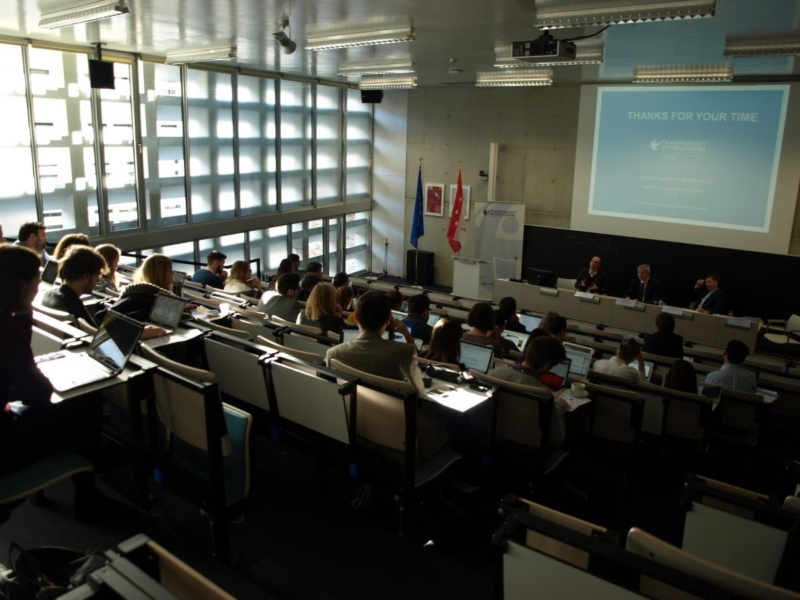Revolving Doors TI-EU Policy BriefOver the 2015/16 academic year Transparency International EU worked closely with the College of Europe in Bruges to raise awareness on issues of corruption and democratic legitimacy among students eager to work with EU institutions in Brussels. Students are called upon to write their thesis on these topics, with Transparency International EU issuing an annual thesis prize for the best thesis focusing on issues of EU integrity, transparency and accountability. The winning student receives a scholarship for the annual Transparency Summer School in Vilnius, Lithuania, bringing together anti-corruption professionals from across the world.
The announcement led to the initiative for a student-run Transparency Club. We also partnered with the College to organise the “EU Accountability Labs”. This conference aimed to inform students about democratic accountability arrangements at EU level and various transparency tools, enabling and promoting active monitoring of EU institutions and their the decision-making processes.
The full day event: “What are the challenges of Transparency and Accountability for EU Institutions?” on 14 January 2016 at the College of Europe involved a morning opening plenary with presentations by TI EU, a Member of the European Parliament and the European Ombudsman’s office, followed by interactive workshops with the students in the afternoon. It was attended by over 50 students from across the five academic departments.
The Club members took an internal poll to decide upon the thematic areas of focus at the beginning of the academic year. These areas served as the basis for the workshop themes, and were later elaborated by the students into concrete policy papers featured on this page. The themes chosen by the students were: the Transatlantic Trade and Investment Partnership (TTIP), the integrity of Eurozone institutions, and conflicts of interest in EU institutions.
By Clara Hanot, Thomas Jacobs, Edita Jatulyte and Caroline Strunk
Over the last few years whistleblower protection has become a hot topic at various political levels. Thanks to the Panama Papers, elites are put under more intense public scrutiny, and are more vividly encouraged to facilitate channels that allow for reporting wrong-doing. Nevertheless, despite commitments to transparent and democratic governance, the level of whistleblower protection varies greatly between EU institutions and EU member states. The following policy paper presents an overview of whistleblower protection in the European Parliament and four EU countries – Belgium, France, Germany and Lithuania, and tries to identify the biggest impediments for more comprehensive whistleblower protection. It concludes with a number of recommendations on what further steps should be taken by both European and national institutions.
By Guido Boccardo, Silvia Cossu, Edoardo Fagiolini
This policy paper assesses the new EIB transparency policy adopted in 2015. The overall reform of the transparency policy is only partially convincing. The present paper evaluates provisions on access to documents and the independence of the bank as regards investment decisions. This is done via a comparison between the implementation of the previous and current transparency policy and an analysis of EIB investment decisions in light of the composition of the bank’s capital stock and the different weight of its shareholders.
Revolving Doors TI-EU Policy Brief
By Marine Borchardt, Elisa Gallego, Marikki Riepolla, Melissa Thomas
This policy brief looks at the revolving door phenomenon in the European Parliament (EP). Looking at the EP’s current Code of Conduct it becomes clear that there is a huge gap regarding MEPs’ post-employment activities. This topic is particularly relevant given the democratic and transparency standards that the EP as a directly elected institution should uphold. The paper is a comparative study of the cooling-off periods, the watchdog committees, and the enforcement measures in place in the US, Canada, Germany and the UK. Based on their best practices the aim is to provide a set of clear recommendations to bring conflict of interest rules for MEPs up to the best national standards.
Gazprom and Energy Security Implications in the EU
By Maryna Kornilova, Iryna Dobrohorska
The presence of the third country actors on the EU energy market is not a new phenomenon, given the large share of energy imports to the EU. However, external actors too have to comply with EU lobbying regulation and article 10 TEU that envisages a transparent functioning of the EU institutions. At the same time Gazprom, in light of the particularly political nature inherent to large energy companies, operates beyond the narrow scope of its commercial interests. To strengthen its visibility in the EU, the company works with the external consultancy G-plus Europe since 2007. This paper assesses the economic implications of Gazprom’s activities along with its interest representation within the EU energy market.
By Robin Loos, Diletta De Cicco, Thaïs Payan, Axel Cousin
The negotiation on the Transatlantic Trade and Investment Partnership (TTIP) is one of the most controversial topics in the field of transparency at the EU level. If the negotiations succeed, the treaty is an opportunity to raise public awareness on transparency as a key aspect of international trade and global regulation. However, because of the high amount of sometimes contradictory information on the subject, many questions are left unanswered while the legitimacy of the Commission to handle the negotiation process is being challenged. This policy paper provides a critical assessment of the current TTIP negotiations in light of its legal aspects, the legitimacy of the Commission and the role of the media in the treatment of the information. This three-step analysis offers a global overview of the main concerns without falling into the downsides of the current public debate filled with myths and irrational fears.
We at Transparency International EU look forward to cooperating with the 2016/17 John Maynard Keynes promotion at the College of Europe, to continue increasing awareness on the need for transparency, integrity and democratic accountability in EU institutions as part of a broader European push to regain public trust.








